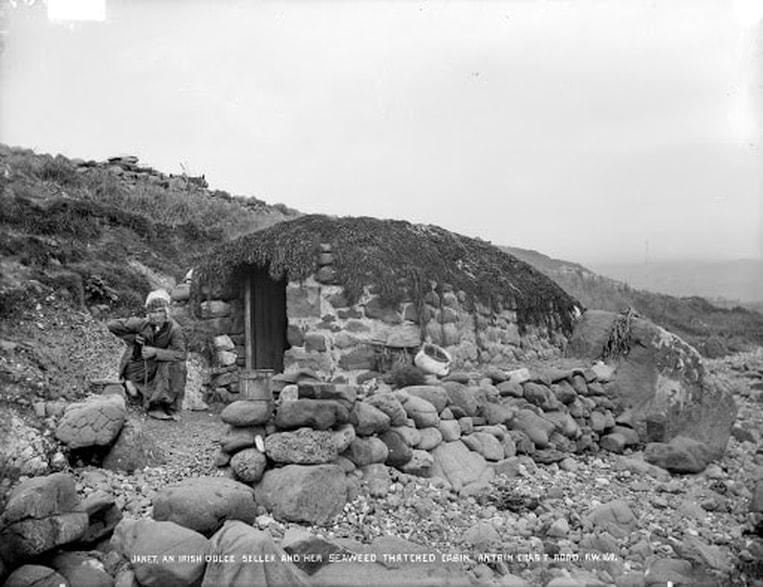|
“Perhaps the saddest incident comes from Ballygalley. An old woman, named Jane Parke, well-known to most of the residents of the neighbourhood, resided in a roughly-built cabin under the sea wall, a short distance on this side of the Halfway House. She lived principally by charity and recently was in receipt of Poor-Law Relief. Repeated warnings had been given her of the danger she incurred by continuing to reside in her tumble-down shanty in rough weather, but she was deaf to all advice, and now had met her death as the result of her obstinacy, her dwelling being completely wrecked and she either drowned by the heavy seas or was killed by the walls falling in on her.”
Larne Times, 29 December 1894 The following blog post was written in March 2020 after a walk around Ballygally trying to locate the position of Jean Park's home. Since writing it, a team of Jean Park enthusiasts have been in touch with more information, and this has become a truly enticing tale. I have highlighted anything new with an asterisk. Many thanks for your help.* I’m holding up the photograph of you, Jean Park — a face born of boulder, rock and shingle — but you did not emerge from these rocks; they say you emerged from the sea, a small baby found in a boat in her dead mother’s arms. Your face is contorted and twisted with age, older than your 71 years, but you had no time to prepare for any photographer. Did you know what you were doing when you agreed to squat down and look at the camera? Was the photograph taken the same year you died? A farewell. Something to make your legend real. I want to find a way to know where you resided. Was it on this spot, by Ballygally Head? I see the photographer, Robert John Welch, climbing down from the road past the seaweed drying out along the wall. I see him tip his hat and approach you. Today, you’re his golden find. He would record your name as Janet, but we know you as Jean, the common Ulster pronunciation of the name Jane. I hold up my mobile phone and see the rocks and the grassy bank and picture the telegraph pole in the photograph that was damaged the night that you were washed away. Above it are the mountains that stretch out along Path Head — misty in your photograph; exactly proportional to what I see through my iPhone’s eye. My brother sees Ballygally Castle behind you. (He sees castles where I see walls). The bank is ever-changing, as we witnessed with the carving of a large swathe of coast at Ballygally in a recent storm. Rocks come and go, but this seems like a good hiding place, an opportunistic spot; you would have been the first person to be seen as the tourists rounded the bend at Ballygally Head. This bay is the cold, dark edge of Ballygally. Did you pick it because you knew that no one would bother you here, that no authority would climb down and question you? It’s a cove below the head of a sleeping giant, whose face is handsome on approach from Larne or looking down from Sallagh, but here, up close, he’s stark and cold and covered in lichen.
12 Comments
|
ProseHistory & folkloreJean Park of Ballygally
Fiddles and Melodeons Martha Taylor's diary Jean McCullagh at 104 Ballymena & the McConnells Arms in Irish Dancing Catholics & Protestants in Irish dancing Dancing in Victorian Ulster Essays
|

 RSS Feed
RSS Feed